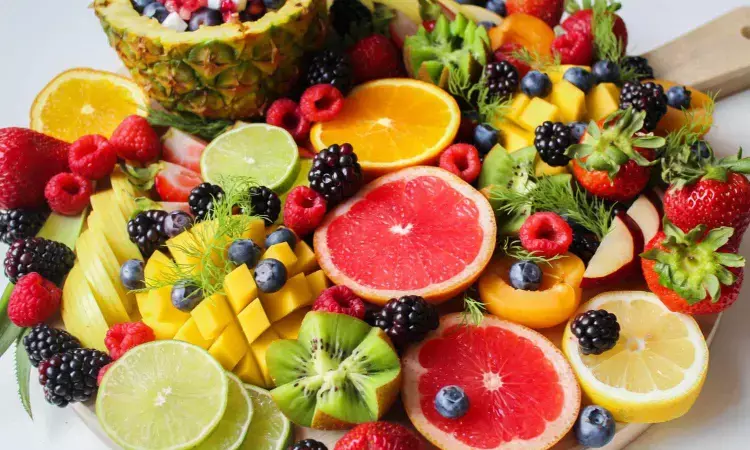- Home
- Medical news & Guidelines
- Anesthesiology
- Cardiology and CTVS
- Critical Care
- Dentistry
- Dermatology
- Diabetes and Endocrinology
- ENT
- Gastroenterology
- Medicine
- Nephrology
- Neurology
- Obstretics-Gynaecology
- Oncology
- Ophthalmology
- Orthopaedics
- Pediatrics-Neonatology
- Psychiatry
- Pulmonology
- Radiology
- Surgery
- Urology
- Laboratory Medicine
- Diet
- Nursing
- Paramedical
- Physiotherapy
- Health news
- Fact Check
- Bone Health Fact Check
- Brain Health Fact Check
- Cancer Related Fact Check
- Child Care Fact Check
- Dental and oral health fact check
- Diabetes and metabolic health fact check
- Diet and Nutrition Fact Check
- Eye and ENT Care Fact Check
- Fitness fact check
- Gut health fact check
- Heart health fact check
- Kidney health fact check
- Medical education fact check
- Men's health fact check
- Respiratory fact check
- Skin and hair care fact check
- Vaccine and Immunization fact check
- Women's health fact check
- AYUSH
- State News
- Andaman and Nicobar Islands
- Andhra Pradesh
- Arunachal Pradesh
- Assam
- Bihar
- Chandigarh
- Chattisgarh
- Dadra and Nagar Haveli
- Daman and Diu
- Delhi
- Goa
- Gujarat
- Haryana
- Himachal Pradesh
- Jammu & Kashmir
- Jharkhand
- Karnataka
- Kerala
- Ladakh
- Lakshadweep
- Madhya Pradesh
- Maharashtra
- Manipur
- Meghalaya
- Mizoram
- Nagaland
- Odisha
- Puducherry
- Punjab
- Rajasthan
- Sikkim
- Tamil Nadu
- Telangana
- Tripura
- Uttar Pradesh
- Uttrakhand
- West Bengal
- Medical Education
- Industry
Eating more fruits and veggies could help you sleep better: Study

From counting sheep to white noise and weighted blankets, people have tried innumerable ways to get a good night's sleep. Sleep disruptions can have far-reaching negative consequences, impacting cardiovascular and metabolic health, memory, learning, productivity, mood regulation, interpersonal relationships and more.
It turns out that an important tool for improving sleep quality may have been hiding in plain sight…in the produce aisle. A new study led by researchers at the University of Chicago Medicine and Columbia University found that eating more fruits and vegetables during the day was associated with sleeping more soundly later that same night.
“Dietary modifications could be a new, natural and cost-effective approach to achieve better sleep,” said co-senior author Esra Tasali, MD, director of the UChicago Sleep Center. “The temporal associations and objectively-measured outcomes in this study represent crucial steps toward filling a gap in important public health knowledge.”
Uncovering the connection between diet and sleep
Studies have shown that inadequate sleep can cause people to gravitate towards unhealthier diets higher in fat and sugar. However, despite the far-reaching effects of sleep on public health and even economic productivity, doctors and scientists know far less about how diet can affect sleep patterns.
In previous observational studies, high fruit and vegetable intakes were associated with better self-reported overall sleep quality, but this new study was the first to draw a temporal connection between a given day’s dietary choices and objectively-measured sleep quality that same night.
Healthy young adults who participated in the study reported their food consumption each day with an app and wore a wrist monitor that allowed the researchers to objectively measure their sleep patterns. The researchers specifically looked at “sleep fragmentation,” an index that reflects how often someone awakens or shifts from deep to light sleep throughout the night.
Promising findings support dietary guidelines
The researchers found that each day’s diet was correlated with meaningful differences in the subsequent night’s sleep. Participants who ate more fruits and vegetables during the day tended to have deeper, more uninterrupted sleep that same night, as did those who consumed more healthy carbohydrates like whole grains.
Based on their findings and statistical modeling, the researchers estimate that people who eat the CDC-recommended five cups of fruits and veggies per day could experience a 16 percent improvement in sleep quality compared to people who consume no fruits or vegetables.
“16 percent is a highly significant difference,” Tasali said. “It’s remarkable that such a meaningful change could be observed within less than 24 hours.”
Future studies will help establish causation, broaden the findings across diverse populations, and examine the underlying mechanisms of digestion, neurology, and metabolism that could explain the positive impact of fruits and vegetables on sleep quality. But based on current data, the experts confidently advise that regularly eating a diet rich in complex carbohydrates, fruits, and vegetables is best for long-term sleep health.
“People are always asking me if there are things they can eat that will help them sleep better,” said co-senior author Marie-Pierre St-Onge, PhD, director of the Center of Excellence for Sleep & Circadian Research at Columbia. “Small changes can impact sleep. That is empowering-better rest is within your control.”
Reference:
Boege, Hedda L. et al., Higher daytime intake of fruits and vegetables predicts less disrupted nighttime sleep in younger adults, Sleep Health, DOI:10.1016/j.sleh.2025.05.003
Dr Kamal Kant Kohli-MBBS, DTCD- a chest specialist with more than 30 years of practice and a flair for writing clinical articles, Dr Kamal Kant Kohli joined Medical Dialogues as a Chief Editor of Medical News. Besides writing articles, as an editor, he proofreads and verifies all the medical content published on Medical Dialogues including those coming from journals, studies,medical conferences,guidelines etc. Email: drkohli@medicaldialogues.in. Contact no. 011-43720751


